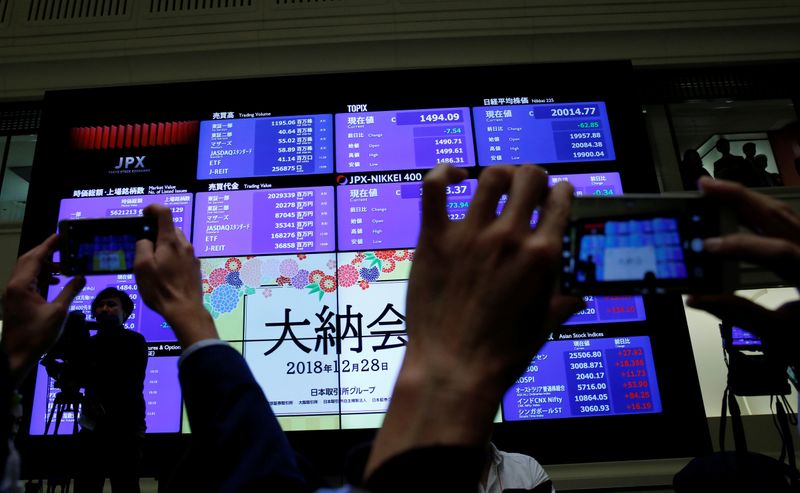By Marc Jones
LONDON (Reuters) - European shares were rising again after a two-day wobble on Thursday as China's markets continued their charge, and something between fear and greed propelled gold to a nine-year high.
Chinese stocks set their longest winning streak in two years and the yuan had strengthened past 7 per dollar overnight, despite rising tension over Hong Kong and the economic uncertainty caused by COVID-19.
It was the Shenzhen blue-chip index's eighth straight day of gains, adding another 1.5% to its 16% surge this month, and pushed Europe in the right direction after some hesitation caused by uninspiring German data.
Also improving risk sentiment was the dollar’s downward momentum – it was at a one-month low against the euro, a three- week low versus the British pound and four-month lows against the Swiss franc.
That was a green light for emerging markets too. MSCI's EM currency index was at a one-month high. Trade- and commodity- related currencies also reacted to China's gains. The New Zealand dollar was at the highest since January and the Aussie dollar at a one-month high.
"We've seen a more generalised view back to riskier assets. The Chinese equity surge has been the poster child for risk-on move across the last few sessions," said Jeremy Stretch, CIBC Capital Markets' head of G10 FX strategy.
Asia's investors have been riding high after a front-page editorial in Monday's China Securities Journal extolling market fundamentals, which was taken as official encouragement to buy stocks.
State-run media warned on Thursday that investors should still pursue rational investments and manage risks, but that didn't rein in the bulls.
MSCI's broadest index of Asia-Pacific shares outside Japan (MIAPJ0000PUS) rose 0.8% and touched a 20-week high. The yuan
"Broadly speaking, the Chinese economy is coping better not only with a recovery but also in dealing with the potential of a second wave (of infections)," said National Australia Bank FX strategist Rodrigo Catril.
"Rightly or wrongly, that market is liking the idea that the yuan can strengthen on the back of equity inflows."
Although China's factory-gate prices fell for a fifth straight month in June, signs of a pickup suggest a slow but steady recovery remains intact.
Elsewhere, German export figures recovered less than expected in May as demand remained subdued despite lockdowns being lifted in large parts of Europe.
They jumped by 9% on the month after diving by 24% in April, but economists had been hoping for a near 14% bounce and the numbers remained almost 27% lower than their pre-crisis level in February, the Federal Statistics office said.
Deutsche Bank (DE:DBKGn)'s chief international strategist, Alan Ruskin, said the yuan enjoyed the "perfect combination" of tight monetary policy, yield advantage and equity demand.
In any case, its rally ignored growing pressure from the West over China's tightening grip on Hong Kong, surging U.S. coronavirus cases and a fresh lockdown of 5 million Australians in Melbourne.
Australia's benchmark ASX 200 index (AXJO) rose 1% and Japan's Nikkei (N225) rose 0.6%. The Australian dollar
U.S. Treasuries were not sold into the rally, either. Nor were the safe havens of gold or the Japanese yen. The yield on benchmark U.S. 10-year Treasuries (US10YT=RR) remained under pressure at 0.6545% and gold
EARNINGS AHEAD
The U.S. earnings season approaches with investor hopes high for a stabilisation, but warning signals are flashing and Federal Reserve officials raised fresh doubts on Wednesday about the durability of the rebound.
The United States has also posted its largest number of daily new coronavirus cases since the outbreak began and global tensions are on the rise.
U.S. jobs data due at 1230 GMT will offer the next checkup on the recovery's progress, followed by results next Tuesday from J.P. Morgan (N:JPM), Citigroup (N:C) and Wells Fargo (N:WFC), then Microsoft (O:MSFT) and Netflix (O:NFLX) on Thursday.

"Earnings season is upon us, and we really want to see what it looks like," said Jun Bei Liu, a portfolio manager at Australia's Tribeca Investment Partners.